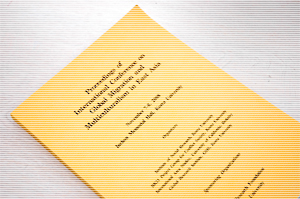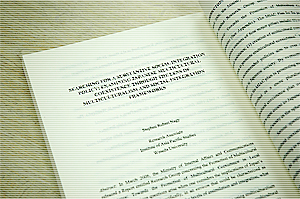社会・文化領域
人材育成:支援スキーム:調査研究支援スキーム(学生)
Stephen Robert NAGY / 調査地域:韓国・ソウル(Korea University)
2008.11.05
調査地域
リサーチ目的
Based on my research theme "Inter-regional Asian Emigration and the Potential for International cooperation in East Asia: A Comparative Examination of State Integration Policies in Korea and Japan," my research trip consisted of two primary, and one secondary objective: (1) To meet with Professor Shinwa Lee, expert in human security related issues; and (2) Attend a symposium entitled "Global Migration and Multiculturalism in Asia. Through an introduction and recommendation by Professor Tsuneo Akaha, Professor Shinwa Lee would provide valuable insight and materials on potential areas of cooperation between Korea and Japan in the area of human security, especially from the vantage point of migration and the movement of people in Asia. The symposium would complement this meeting through the exchange of research related to migration related issues in Taiwan, Korea and Japan. My secondary objective was to investigate the possibility of a collaborative project with Korea University's Professor Injin-Yoon and National Taiwan University's Professor Yen-Fen Tseng comparing migration policies in Taiwan, Korea and Japan.
研究課題
Title: Inter-regional Asian Emigration and the Potential for International cooperation in East Asia: A Comparative Examination of State Integration Policies in Korea and Japan
This research project aims to comparatively examine the integration practices of Japan and Korea at the state level to understand the measures being taken to mitigate some of the migratory pressures resulting from deepening Asian regional integration and to enhance human security in the region. Specifically, I aim to examine the state-led initiatives vis-a-vis Japan and Korea’s burgeoning multicultural societies in an effort to comparatively examine their approaches to securing human rights and security of their growing migrant populations. Through identifying parallels and differences in the approaches of the Japanese and Korean governments in terms of securing human rights and security, the author will outline potential areas of cooperation in dealing with growing trans-border migration between these two countries and in Asia in general.
事業推進担当者
成果
On November 6th, I met with Professor Shin Wa Lee to discuss Korea’s perspective on human security in Northeast Asia and potential opportunities for cooperation between Korea and her neighbours. In addition to a lengthy interview with Professor Lee related to human security, in particular a focus on maximum and minimum human security in accordance with level of development in particular countries, Professor Lee generously provided me with several articles and materials to supplement my research. We also agreed to met in December again for further discussions.
On the eve on the 6th, I met with Professor In-jin Yoon of Korea University and I attended a special lecture by Professor Yen-Fen Tseng on Taiwanese migration issues. Professor Yen’s lecture stressed the class and gender based nature of the migration debate in Taiwan, highlighting that Taiwanese migration policy has developed to mobilise Taiwanese women into the workforce. This mobilisation starkly contrasts with both Japan and Korea, both of whom remain reticent to domestic workers. It has also resulted in human security and rights violations of migrant workers, including domestic workers.
The final two days of my research trip (November 7-8, 2008) manifested themselves in the participation of the International Conference on Global Migration and Multiculturalism in East Asia in which I presented a paper. The papers presented in the conference provided valuable information in four areas directly related to my be research objectives: (1) the origins and development of multiculturalism in Korea; (2) the role of the state in Korea immigration policy; (3) the characteristics of Korean multiculturalism; and (4) the role of non-state actors in immigration policy in Korea and Japan. I was able to engage in in-depth exchanges with leading exponents in the field of migration studies in Asia including but not exclusive to Prof. Keiko Yamanaka (Berkeley), Prof. Timothy Lim (California State University, Prof. Yoon In-jin (Korea University), Prof. Woo-Seon Kim (Sogang University), and Prof. John Lie (Berkeley). The exchanges were complemented with full papers being distributed as part of the conference proceedings.
Lastly, as part of this research trip I was able to present a paper on multicultural coexistence policies in Japan and receive valuable, constructive criticism from experienced scholars in terms of suggestions of how to turn my working paper into an article for publication.
Proceedings of International Conference on Global Migration and Multiculturalism in East Asia
